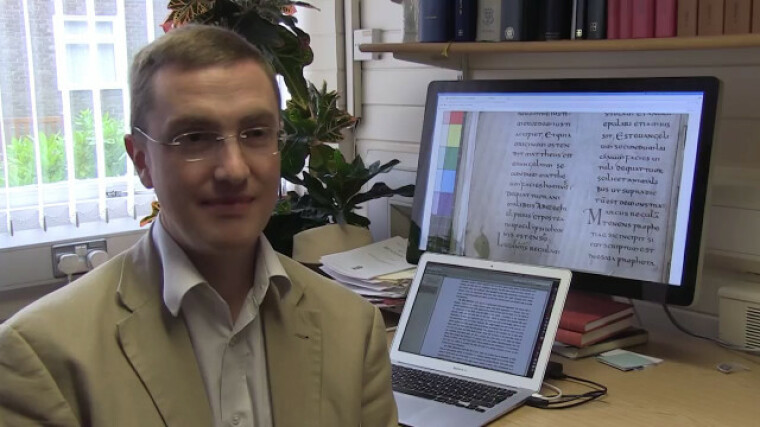Researchers rediscover Latin Bible commentary that has been lost for 1,500 years

Researchers at the Cologne Cathedral Library in Germany have rediscovered the earliest known Latin commentary on the Gospels that has been lost for more than 1,500 years.
The biblical commentary, which dates back to the middle of the fourth century, was written by a bishop in northern Italy named Fortunatianus of Aquileia. Earlier this week, the library published an English translation of the 160-chapter document.
According to Catholic News Agency, the commentary was widely known to have existed, but many scholars have thought that it had either been destroyed or permanently lost. It was originally rediscovered in a form of an unmarked manuscript dating back to about 800 A.D. in 2012 by Lukas Dorfbauer, a researcher from the University of Salzburg.
Scholars have overlooked the majority of the manuscript's biblical content, but Dorfbauer conducted further research on the document and found that it seemed to date back further than the ninth century.
The commentary by Fortunatianus has been mentioned by St. Jerome in his work, "Lives of Famous Men." Dorfbauer took notes on the document and compared some of its contents to St. Jerome's writings on Fortunatianus in the fourth century.
"I was able to compare the biblical quotations in the Cologne manuscript with our extensive databases," said Dr. Hugh Houghton, the Deputy Director at the Institute for Textual Scholarship and Electronic Editing (ITSEE) at the University of Birmingham.
"Parallels with texts circulating in northern Italy in the middle of the 4th century offered a perfect fit with the context of Fortunatianus," he added.
Houghton, who is a specialist in the Latin New Testament, began comparing quotes from the rediscovered manuscript with other fourth century texts by using the university's database. In his analysis, he found that the comparison "seemed to preserve the original form of Fortunatianus' groundbreaking work."
"Such a discovery is of considerable significance to our understanding of the development of Latin biblical interpretation, which went on to play such an important part in the development of Western thought and literature," he said.
The manuscript mainly focuses on the Gospel of Matthew, but there are brief references to the gospels of Mark, Luke and John.
The rediscovered document has been found to predate the Vulgate which was once known as the earliest form of written Latin commentary of the Gospels. However, the manuscript remains far less popular than the Vulgate because of its recent discovery.
"It will still be some time before this work becomes as widely known as the famous writings of later Christian teachers such as Ambrose, Augustine and Jerome," said Houghton.
 Christians don't have to affirm transgenderism, but they can’t express that view at work: tribunal
Christians don't have to affirm transgenderism, but they can’t express that view at work: tribunal Archaeology discovery: Medieval Christian prayer beads found on Holy Island
Archaeology discovery: Medieval Christian prayer beads found on Holy Island Presbyterian Church in America votes to leave National Association of Evangelicals
Presbyterian Church in America votes to leave National Association of Evangelicals Over 50 killed in 'vile and satanic' attack at Nigerian church on Pentecost Sunday
Over 50 killed in 'vile and satanic' attack at Nigerian church on Pentecost Sunday Ukrainian Orthodox Church severs ties with Moscow over Patriarch Kirill's support for Putin's war
Ukrainian Orthodox Church severs ties with Moscow over Patriarch Kirill's support for Putin's war Islamic State kills 20 Nigerian Christians as revenge for US airstrike
Islamic State kills 20 Nigerian Christians as revenge for US airstrike Man who served 33 years in prison for murder leads inmates to Christ
Man who served 33 years in prison for murder leads inmates to Christ


 Nigerian student beaten to death, body burned over ‘blasphemous’ WhatsApp message
Nigerian student beaten to death, body burned over ‘blasphemous’ WhatsApp message 'A new low': World reacts after Hong Kong arrests 90-year-old Cardinal Joseph Zen
'A new low': World reacts after Hong Kong arrests 90-year-old Cardinal Joseph Zen Iran sentences Christian man to 10 years in prison for hosting house church worship gathering
Iran sentences Christian man to 10 years in prison for hosting house church worship gathering French Guyana: Pastor shot dead, church set on fire after meeting delegation of Evangelicals
French Guyana: Pastor shot dead, church set on fire after meeting delegation of Evangelicals ‘Talking Jesus’ report finds only 6% of UK adults identify as practicing Christians
‘Talking Jesus’ report finds only 6% of UK adults identify as practicing Christians Mission Eurasia ministry center blown up in Ukraine, hundreds of Bibles destroyed: 'God will provide'
Mission Eurasia ministry center blown up in Ukraine, hundreds of Bibles destroyed: 'God will provide' Church holds service for first time after ISIS desecrated it 8 years ago
Church holds service for first time after ISIS desecrated it 8 years ago Burger King apologizes for 'offensive campaign' using Jesus' words at the Last Supper
Burger King apologizes for 'offensive campaign' using Jesus' words at the Last Supper Uganda: Muslims abduct teacher, burn him inside mosque for praying in Christ’s name
Uganda: Muslims abduct teacher, burn him inside mosque for praying in Christ’s name